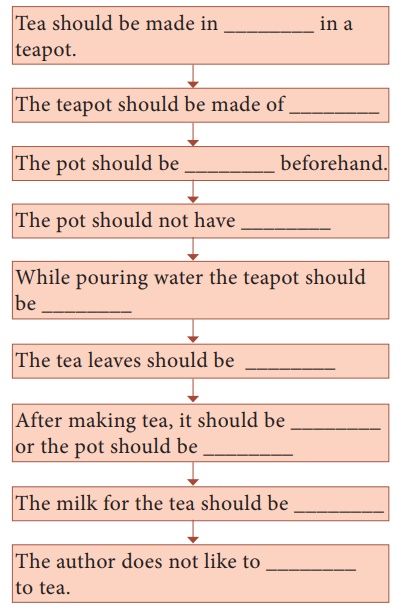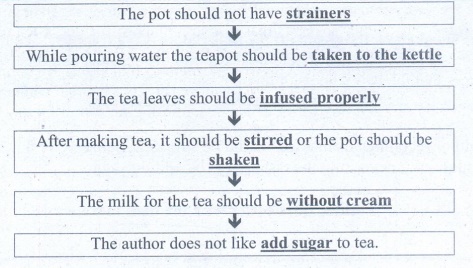A Nice Cup of Tea | Prose | By George Orwell - Questions Answers | 12th English : UNIT 2 : Prose : A Nice Cup of Tea
Chapter: 12th English : UNIT 2 : Prose : A Nice Cup of Tea
Questions Answers
1. Based on your understanding of the text, answer each of the following questions in one or two sentences.
a) What seems ‘curious’ to the author?
The best manner of making tea is the subject
of violent disputes. It seems ‘curious’ to the author.
b) Why does the author say that it is important to include a tea recipe in cookery books?
The best manner of making tea is the subject of violent disputes. So the author says that if is important to include a tea recipe in
cookery books.
c) Mention the countries in which tea is a part of civilization.
Tea is a part of civilization in Eire
(Ireland), Australia, New Zealand, China, Ceylon and India.
d) Which tea does the author prefer– China tea or Indian tea?
The author prefers Indian tea.
e) According to the author, what does the phrase ‘a nice cup of tea’ refer to?
According to the author, the phrase ‘a nice cup
of tea’ refers to Indian tea.
f) What is the second golden rule in the preparation of tea?
Tea should be made in small quantities in a
teapot: The teapot should be made of china or earthenware. This is
the second golden rule in the preparation of tea.
g) How does army tea taste?
Army tea is made in a cauldron. So it
gives taste of grease and whitewash.
h) Do tea lovers generally like strong tea or weak tea?
Tea lovers generally like strong tea.
i) Why should tea be directly added to the pot?
If the tea (tea powder) is not loose in the
pot directly, it never infuses with water properly. If it so, they are
supposed to be harmful. So tea should be directly added to the pot.
j) Why does the author prefer the cylindrical cup to a flat cup?
The author prefers the cylindrical cup to a flat
cup because it holds more tea and keeps it hot before one has well
started on it.
k) What should be poured into the cup first–tea or milk?
Tea should
be poured into the cup first.
l) Why does the author advise removing cream from the milk?
Milk that is too creamy always gives tea a
sickly taste. So the author advises removing cream from the milk.
m) Does the author like drinking tea with sugar? Give reasons.
No, the
author does not like drinking tea with sugar. If we sweeten tea, we won’t taste
tea. We are merely tasting the sugar.
n) Why does the author refer to himself as being in ‘a minority’?
Majority of
the people add sweetener to tea. But the author drinks tea without
sugar. So he refers to himself as being in ‘a minority’.
o) Whom does the author call ‘misguided people’? What is his advice to them?
One who add sweetener to tea, the author calls them ‘misguided people’. He advised them to try
drinking tea without sugar for a fortnight. They never want to ruin their
tea by sweetening it again.
2. Based on your understanding of the text, answer each of the following questions in four or five sentences
a) What are the author’s views on China tea?
China tea has qualities which are not to be
disliked nowadays. It is economical. One can drink it without milk. But
there is not much stimulation in it. One does not feel wiser, braver or
more optimistic after drinking it.
b) How does adding sugar affect the taste of tea?
If we sweeten tea, we won’t taste the tea. We
are merely tasting the sugar. We could make a very similar drink by dissolving
sugar in plain hot water. Thus adding sugar affects the taste of tea.
c) Elucidate the author’s ideas about teapots.
Tea should be made in small quantities in a
teapot. Tea out of an urn is always tasteless. But
Army tea is made in a cauldron. It gives taste of grease and
whitewash. The author feels that the teapot should be made of China or
earthenware. Silver or Britannia ware teapots produce inferior tea. Enamel pots
are worse. But a pewter teapot is not so bad.
3. Answer each of the following questions in a paragraph of 100–150 words.
a) Summarise George Orwell’s distinctive ideas in “A Nice Cup of Tea”.
Prose : A NICE CUP OF TEA
Author : George Orwell
Theme : Distinctive features of preparing a nice cup of tea
Character : George Orwell (The narrator)
Outline : suggests eleven points - Indian or Ceylonese tea - small quantities - china or earthenware teapot - pot be warmed beforehand - Strong tea - tea powder put straight into pot - add hot water with tea powder - Stir or shake it - use breakfast cup - pour the cream off the milk - tea first milk next - drunk without sugar
b) Discuss how the essay reveals the factual points and the author’s personal opinions on the preparation of tea.
c) What are the aspects that contribute to humour in the essay?
4. Based on your understanding of the text, complete the chart given below by choosing the appropriate words or phrases given in brackets.
Golden Rules of Tea Preparation
(add sugar, shaken, milk, infused properly, strainers, without cream, taken to the kettle, small quantities, China or earthenware, stirred, warmed)


Essay
Introduction
Nice cup of tea
Tea pot
Tea powder
Making of tea
Adding milk
Conclusion
Introduction
The essay ‘a nice cup of tea’ reveals the factual points, the author George Orwell’s personal opinions and his sense of humour on the prepararion of tea.
Nice cup of tea:
George Orwell funnily says that the best manner of making tea is the subject of violent disputes. He suggests eleven points to prepare a nice cup of tea. First of all, he suggests that one should use Indian or Ceylonese tea. According to him, ‘a nice cup of tea’ means Indian tea. He humourously comments that one does not feel wiser, braver or more optimistic after drinking the Chinese tea.
Tea pot:
Secondly, tea should be made in small quantities in a teapot. He recommends that the tea pot should be made of China or earthenware. Thirdly, the pot should be warmed beforehand.
Tea powder:
Fourthly, the tea should be strong. For this he suggests six heaped teaspoons of tea powder. Fifthly, the tea powder should be put straight into the teapot to infuse properly. He wittingly uses the term “imprison the tea” which means the tea powder should not be separated with strainers, muslin bags or other devices .
Making of tea:
Sixthly, one should add water with tea powder, while it boils in the kettle. Seventhly, after making the tea, one should stir it. Eighthly, one should use a good breakfast cup which holds more tea. •
Adding milk:
Ninthly, one should pour the cream off the milk before using it for tea. Tenthly, While adding milk with tea, he supports that one should pour tea into the cup first and then add milk in it. He funnily introduces that the two schools of thought on this subject which are milk-first school and tea-first school. Lastly, the author suggests to drink tea without sugar.
Conclusion:
Thus the author recommends that tea should be stronger and tasty.While drinking tea, it should be harmless. We never ruin the taste of tea by adding sugar.
Nothing goes better with tea than more tea
Related Topics